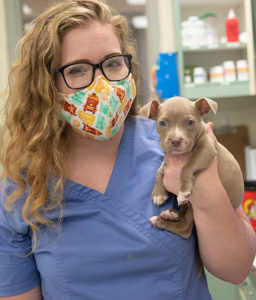Even if your pet is healthy, accidents and illnesses can happen suddenly. Pet insurance can help you focus on your pet’s recovery—rather than the medical bill.
But there are many options, and choosing the right coverage for your companion is not as simple as one might think.
Cost, coverage, and choices are all over the map. Here are some things to know when navigating the pet insurance options.

- Health insurance vs. major medical: When deciding how to manage the cost of your pet’s veterinary care, consider what you can afford each month and how much you can pay for an emergency or serious illness. Generally speaking, the more care you can afford to pay out of pocket, the less coverage you need and the less expensive your premium payment would be. Companies typically offer three to four levels of coverage.
- Plan coverage options expand to include illnesses in addition to injuries. Illnesses can be anything from a mild upper respiratory issue to cancer. Policies range quite a bit at this level, so it is important to compare coverage and look at exclusions. It is helpful to know what sorts of illnesses your pet may be prone to contracting.
- Upgrading from there, policies start to cover congenital or hereditary health problems such as orthopedic and joint issues, which can be very expensive to treat and manage. These plans may also cover long term and chronic conditions such as diabetes and seizures – issues that may require medication for the life of the pet.
- Finally, there are the high-end policies which include all of the previously-mentioned issues with the addition of wellness and preventative care. These policies usually cover annual examinations, vaccinations, basic spay/neuter and/or dentistry. Policies like these are the most expensive, and function a bit like human policies. If preventative care is important, but you don’t want to buy the top of the line pet insurance plan, you might still be able to get this coverage. With some companies, wellness care is available as a ‘rider’ with a lesser plan. It’s worth checking into if you would prefer to pay a monthly premium rather than pay annually for your pet’s preventative care. Some policies even offer interesting extras, such as pet boarding, and there are plans that cover alternative therapies such as acupuncture.
Check the details
Monthly premiums can vary widely, and while cost is certainly a consideration, it is unwise to base your choice of a plan totally on price. When you are researching policies, take into consideration the level of coverage, the co-payments, and deductibles, and the maximum policy payouts.
Pet insurance policies are complex, and may have extensive ‘terms and conditions.’ If you don’t understand what you are reading, call the insurance company for help. There are exclusions and requirements, too. One plan may cover illnesses but exclude cancer or hip dysplasia; another plan may exclude any pre-existing conditions and require you to submit a copy of your pet’s medical history prior to issuing a policy.
Be aware of things such as age limitations for the policy, waiting periods for activation, and any restrictions on breeds or activities. Will your coverage get more expensive as your pet ages? Is your pet covered if he is a “working” pet or a “pet therapy” pet?
Also, not all pet insurance companies are licensed to sell in every state. If you’re considering a move, be sure your new policy will work in a different location. If not, you may discover that the health conditions your pet is currently experiencing could be considered a pre-existing, if you have to buy a new policy after relocating.
Plan and don’t wait
Planning is important. Even with pet insurance, you will usually need to pay your veterinarian—in full—at the time of service. Pet insurance policies usually reimburse you, the pet owner; they don’t typically pay the doctor.
Don’t hold off on insurance until your pet is sick or injured. Take the time to research and investigate pet insurance while your pet is healthy. Then, when your pet really needs you, you can focus on the most important thing: your pet’s health and happiness.



